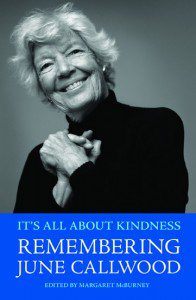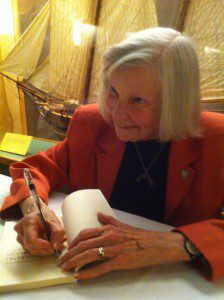
On days such as Victoria Day, and its anachronistic connection to life in 2012, I wonder about how change happens. Is it just the passage of time that helps us recognize that monarchs are people too? Is it just greater access to information that brings down a Berlin Wall? Is it just mellowing that makes a Toronto mayor realize gay lifestyle is a fact of life? Well, yes, time, knowledge and acclimatizing help. But change happens because some push to make it happen. Or, as writer June Callwood observed during a 2002 lecture:
“The profession of journalism enjoys its finest moments when it speaks against oppression and greed.”
The other night I attended an event in honour of June Callwood, who chose to be activist and journalist at the same time. She died in 2007, but Wednesday night a hundred friends and colleagues gathered on the Toronto waterfront, to see plans unveiled for a park to be named in her honour. They also attended the launch of a new book, “It’s All About Kindness: Remembering June Callwood.”

The book’s editor, Margaret McBurney, spoke of Callwood’s often quoted mantra.
“If you see something wrong and don’t do anything about it, June said, then you’re part of the problem.”
Margaret McBurney noted that it was when June’s youngest son Casey was killed by a drunk driver in 1982 that they met. Margaret had lost her son too. The two built the team that eventually created Casey House, a Toronto hospice for people with AIDS. Another member of that team, Pearse Murray, described Callwood as “the velvet steamroller” for initiating change.
“She would look you in the eye and you were a goner,” Murray wrote in McBurney’s book. “It was hard to say no to her.”
Former Ontario cabinet minister George Smitherman wrote a passage for “It’s All About Kindness,” but he recalled the tougher side of contact with June Callwood. As Minister of Health, for example, he remembered what he called “obligatories,” those frequently scheduled meetings with constituents and petitioners to hear their concerns. Though he knew the obligatory with Callwood would always mean an ear full, he learned that June’s “genuine moral authority… triumphs legislative authority every time.”
Smitherman served as provincial representative on the boards of both Casey House and the June Callwood Centre for Young Women and Families (formerly Jessie’s.)
Much of June Callwood’s life – from 1924 to 2007 – was represented by her social activism, but she was also an extraordinary professional writer. McBurney pointed out that Callwood spent 66 years as a freelance journalist. She wrote for Maclean’s magazine and the Globe and Mail. She wrote two dozen books (including the ghost-written autobiographies of TV host Barbara Walters and film director Otto Preminger.) She pioneered TV talk shows in the 1950s, hosted CBC issue shows in the 1970s and received three Order of Canada awards, the Order of Ontario and a bunch of honorary degrees.
One of my fondest memories of June Callwood came from an interview in the early 1990s. I was compiling research for a book about celebrations at the end of the Second World War. She told me she remembered VE Day (May 8, 1945) for two reasons. She said she joined thousands of exuberant Torontonians that day parading up Bay Street. She said she was thrilled the war in Europe was over and that her soon-to-be-born first child would come into a world at peace. Because of journalism, however, June and I often crossed paths, and did so finally in 2003, when I convinced Centennial College (where I teach journalism) to initiate a scholarship in her name. To this day, the June Callwood Scholarship recognizes “a communications student who demonstrates academic achievement and volunteer initiative in the community.”
Some people have referred to her as Canada’s Mother Teresa; she bristled at the moniker “Saint June.” But Callwood’s singular selfless acts filled last Wednesday evening in honour of McBurney’s “It’s All About Kindness” book launch. Among the tributes, CBC Radio host Michael Enright (who MCed the evening) remembered the 1990 funeral of his wife, Janet. Following the graveside ceremony, Daniel, Enright’s eldest son, refused to leave the cemetery. Despite Michael’s every plea, the boy continued to stare at the open grave and wouldn’t budge. June Callwood was in attendance.
“Leave it to me,” she said. After a few quiet moments, Enright overheard Callwood’s words to the 12-year-old boy.
“How would like a ride in a sports car?” she asked and the two disappeared down the road in Callwood’s flashy red Mazda Miata. A few hours later, June delivered Daniel home. But the act of kindness wasn’t without a piece of motherly advice for the widowed Enright.
“I suggest that you might want to have a chat with him about condoms,” she said.
June Callwood often proved she was a leader against injustice, but as community activist Theresa Dobko writes in Margaret McBurney’s book, “Compassion and care for others are as essential to humanity as the air we breathe…”
Thanks for a moving retrospective of the Parler Fort gathering. Our challenge now is to move beyond the adulation and nostalgia that June would have tolerated only if they lead to some greater “use” of her memory. I am hoping that her birthday, June 2, will become an annual day for all her friends and the leaders of the causes she espoused to come together and carry on her legacy by our joint action. I look forward to counting you in that assembly.
Michael is a favourite of mine on CBC. He never seems to miss the plot! He is generous in his interviews, putting everyone at ease, and allows the listener to feel like they are there, with him and his guest. When he has a guest replace him, I am deeply disappointed, though there are some decent replacements. I look forward to Sunday’s, which, otherwise would be dull, without Michael’s steady voice! He makes us proud to be Canadian, and I thank him for his many hours of devoted work. He is a pro, who allows me to remember their are sane, kind people in our country who care!